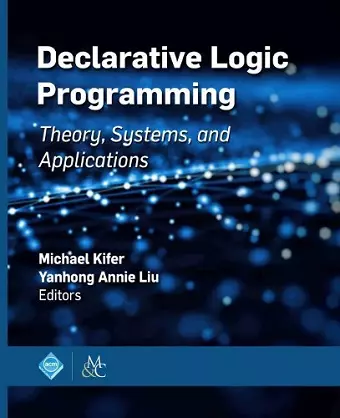Declarative Logic Programming
Theory, Systems, and Applications
Michael Kifer author Yanhong Annie Liu author
Format:Hardback
Publisher:Morgan & Claypool Publishers
Published:19th Sep '18
Currently unavailable, and unfortunately no date known when it will be back

The idea of this book grew out of a symposium that was held at Stony Brook in September 2012 in celebration of David S.Warren's fundamental contributions to Computer Science and the area of Logic Programming in particular.
Logic Programming (LP) is at the nexus of Knowledge Representation, Artificial Intelligence, Mathematical Logic, Databases, and Programming Languages. It is fascinating and intellectually stimulating due to the fundamental interplay among theory, systems, and applications brought about by logic. Logic programs are more declarative in the sense that they strive to be logical specifications of "what" to do rather than "how" to do it, and thus they are high-level and easier to understand and maintain. Yet, without being given an actual algorithm, LP systems implement the logical specifications automatically.
Several books cover the basics of LP but focus mostly on the Prolog language with its incomplete control strategy and non-logical features. At the same time, there is generally a lack of accessible yet comprehensive collections of articles covering the key aspects in declarative LP. These aspects include, among others, well-founded vs. stable model semantics for negation, constraints, object-oriented LP, updates, probabilistic LP, and evaluation methods, including top-down vs. bottom-up, and tabling.
For systems, the situation is even less satisfactory, lacking accessible literature that can help train the new crop of developers, practitioners, and researchers. There are a few guides onWarren’s Abstract Machine (WAM), which underlies most implementations of Prolog, but very little exists on what is needed for constructing a state-of-the-art declarative LP inference engine. Contrast this with the literature on, say, Compilers, where one can first study a book on the general principles and algorithms and then dive in the particulars of a specific compiler. Such resources greatly facilitate the ability to start making meaningful contributions quickly. There is also a dearth of articles about systems that support truly declarative languages, especially those that tie into first-order logic, mathematical programming, and constraint solving.
LP helps solve challenging problems in a wide range of application areas, but in-depth analysis of their connection with LP language abstractions and LP implementation methods is lacking. Also, rare are surveys of challenging application areas of LP, such as Bioinformatics, Natural Language Processing, Verification, and Planning.
The goal of...
ISBN: 9781970001990
Dimensions: unknown
Weight: 825g
615 pages